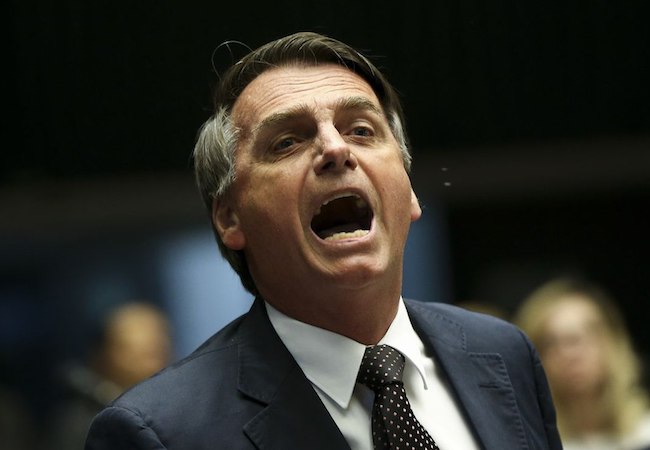Brazil elects neo-fascist Jair Bolsonaro as president: Here is what the West should know

By Connor Martinez
Far-right neo-fascist candidate Jair Bolsonaro was elected president of Brazil on Sunday evening after receiving more than 55 percent of the vote. Trailing behind him was the Workers’ Party candidate, Fernando Haddad, who received less than 45 percent. While the Workers’ Party still holds the majority of seats in Congress, Bolsonaro’s Social Liberal Party also made strides in the election.
It became an increasingly contentious election season in Brazil after the recent jailing of the Workers’ Party’s first candidate and the election’s front runner, former president Luiz Inácio Lula da Silva, on what many on the left have deemed trumped-up corruption charges. The jailing of Lula, as he is popularly known, was a massive blow to the Workers’ Party campaign and forced them to run Haddid, who began the race with limited national recognition.
Fireworks lit up the sky as Bolsonaro supporters cheered for his victory, but for many Brazilians it was a time of mourning for what they saw as the death of Brazilian democracy, and the return to an authoritarian past. In the upper class Barra da Tijuca neighborhood of Rio de Janeiro, Bolsonaro supporters gathered in the thousands outside the candidate’s beach house chanting, cheering, and singing the national anthem. They celebrated what they believe to be the end of corruption in Brazil and an increase in economic opportunity. Inside Bolsonar streamed his remarks on Facebook live, where he said, “We could not continue to flirt with socialism, communism, populism, and the extremism of the left.”
Bolsonaro, the 63-year-old nationalist congressman and former army captain, has given Brazilians and the entire world reasons to mourn his victory. His support of former military dictatorships, torture, police violence, and violence against Afro-Brazilians, indigenous peoples, women, and the LGBTQ community could signal future atrocities and embolden polarization in the country.
“I want a civilian and military police that’s in defense of the people, shoots to kill,” Bolsonaro stated during his campaign. “I’ll give carte blanche for the police to kill, “ he stated at an event in Deerfield Beach, FL. “[Homosexuals] will not find peace. And I have [congressional] immunity to say that I’m homophobic, yes, and very proud of it if it is to defend children in schools,” he said on TWTV.
Media outlets as big as Time Magazine have compared Bolsonaro’s rhetoric to the rhetoric of U.S. President Donald Trump, however Bolsonaro poses a much higher risk to democracy. Bolsonaro’s praise for military dictatorship is reason enough. His statement that Brazil’s “day that lasted 21 years” should have gone further and “should have killed 20 thousand more,” make his violent intentions clear. “It will only change [Brazil], unfortunately, when, one day, we start a civil war here and do the work that the military regime did not do,” he has stated. With an unstable and young democracy, Brazil may be facing a tipping point that could bring an actual civil war.
“This is a dark day for Brazil; Brazilian democracy is now in complete crisis,” said Mark Weisbrot, Co-Director of the Center for Economic and Policy Research. “The international community must help preserve Brazil’s democratic institutions and stand up for the rights of its citizens by letting Bolsonaro know that there will be consequences if he follows through on his dangerous and hateful rhetoric.”
In the late 1980s and 1990s Brazil went through an expansion of neoliberal economics in an effort to provide macroeconomic stabilization. The country followed policy requests from the IMF and World Bank and opened up the country’s resources to global markets. Even though those policies led Brazil to its current state of crisis, the rhetoric used in that era has resurfaced in Bolsonaro’s policies. Paulo Guedes, one of Bolsonaro’s economic strategists, has promised to cut off state assets, cut the public pension system, revise the tax code, and deregulate the economy. Bolsonaro himself has already made a promise to deregulate the economy in order to allow the extraction of the country’s natural resources, mainly oil.
The economics put forward by Bolsonaro are supported by Brazil’s business class, and Brazil’s largest newspaper, Folha De S.Paulo, claims that various business leaders in the country spent up to $3.2 million dollars each to spread fake news on a popular messaging application called WhatsApp. These anti democratic actions have already begun to erode Brazilian democracy, and the election of Bolsonaro could mean further erosion.
As Brazil continues to trudge its way through one of the worst recessions in its history, and confronts serious corruption charges that have discredited every major political institution in the country, it will be up to the left in Brazil to ensure the safety of the country’s most marginalized communities.
It is clear that Bolsanaro will threaten Brazilian democracy, but only time will tell how far the leader will be able to go. Also, because Bolsonaro was democratically elected, his rise to power may inspire the rise of more authoritarian leaders throughout Latin America, as the region continues to struggle with rampant indigence.
Similar to the US and Western Europe, the rise of far right nationalist leaders around the world has been driven by discontent with a corrupt elite class. Brazil, and democracies around the world will have to begin challenging elite power without giving in to their countries most reactionary tendencies. Until then, the world’s political power vacuum will continue to be filled with some of the most extreme demagogues available, and democracy will continue to erode.
Connor Martinez is an editor and freelance journalist with the Organization for World Peace.




